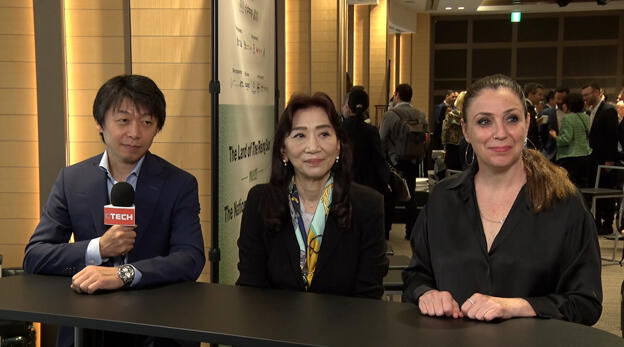
Israel-Japan Conference
Israeli innovation is revolutionizing maternal fetal medicine
From a home ultrasound examination for pregnant women to advanced operations on fetuses, Prof. Asnat Walfisch, Head of the Women's Hospital at Beilinson Hospital, presented innovations to a panel of Japanese experts in the field at Calcalist and Discount Bank’s Israel-Japan Conference. Could such technological tools help with the sharp drop in the birth rate in Japan?
Prof. Asnat Walfisch, Prof. Ritsuko Kimeta Fu, Prof. Katsosuke Ozawa
(Shmulik Dudfur)
The innovation in maternal and fetal medicine through the worlds of artificial intelligence, remote medicine and applications, was at the center of a panel at Calcalist and Discount Bank’s Israel-Japan Conference in Tokyo. Prof. Asnat Walfisch, Head of the Women's Hospital at Beilinson Hospital, participated in the panel together with Prof. Ritsuko Kimeta Pooh, Director of the Center for Prenatal Diagnosis and a world-renowned fetal brain imaging expert at Medical Clinic in Osaka, and Prof. Katsosuke Ozawa, Director of the Center for Fetal Medicine and an expert in fetal surgery at the National Center for Child Development and Health.
The discussion mostly dealt with the opportunities for Beilinson’s technological developments from the worlds of maternal and fetal medicine to help the Japanese cope with the sharp decline in birth rates and the economic hardship that prevents many women in Japan from having children.
Walfisch spoke about the enormous advantages inherent in a home ultrasound examination for pregnant women using a smartphone, a development by Israel’s Clalit Health Services led by Lior Wolff, Head of Translational Innovation, eHealth & Digital Wing at Clalit Health Services. According to Walfisch, "The home ultrasound is a palm-sized device that connects to a smartphone and allows you to independently perform an ultrasound scan of the fetus and transmit it to a dedicated center at Beilinson, which is staffed by medical teams who decode the ultrasound videos. This is a significant leap forward in digital medicine and women's health during pregnancy. We were able to make the ultrasound system smaller and more accessible than the traditional one so that it is suitable for home use. The device provides vital information to the medical teams and helps mothers-to-be to get a quick and accurate picture of the condition of the fetus, thereby giving them peace of mind and preventing unnecessary visits to the clinic or emergency rooms due to one concern or another."
Prof. Pooh referred to the innovative development of the home ultrasound and said: "Japan is a very large country geographically and we would be happy to make it easier for women in Japan and save them from traveling to the medical centers to conduct tests and undergo ultrasound imaging. What's more, it can save them a lot of money, because in Japan, almost all pregnancy tests cost money and are not subsidized."
Another field that came up for discussion in the panel and could lead to collaborations on the Beilinson and Japan axis, is the field of fetal medicine. "Surgeries on fetuses are very rare, it's a new, interesting and complex field," explained Prof. Walfisch. "Fetal surgeries are successfully performed in Beilinson, but because this is rare, we may be able to cooperate with our Japanese colleagues and learn from the surgeries they perform, while they can take part and learn from the life-saving surgeries we perform in Beilinson."
Prof. Katsosuke Ozawa, a specialist in fetal medicine, said: "We would be happy to cooperate with Beilinson in the field of fetal surgery. This is a new field and currently very limited in the world and there are very few such complex surgeries, therefore it is of great importance for collaborations between medical centers that are already experimenting with this with great success and so we can learn from each other. In addition, we would like to adopt some of the innovative medical tools that were presented to us here at the conference."
Prof. Walfisch summarized the discussion and said: "There are many differences both in the status of women and in women's medicine between Japan and Israel. In Japan, the birth rate is low and the population is older, and in Israel it is the opposite, so the challenges are different. From an economic point of view, women in Israel are insured for all aspects of fertility, pregnancy and childbirth, and in Japan, most treatment during pregnancy is privately funded, but there are many interfaces in the technological aspect and a lot of interest from the Japanese in the technologies we offer, such as telemedicine and the possibility of doing fertility treatments and follow-up using remote medicine."
You can watch the full panel in the video above.















